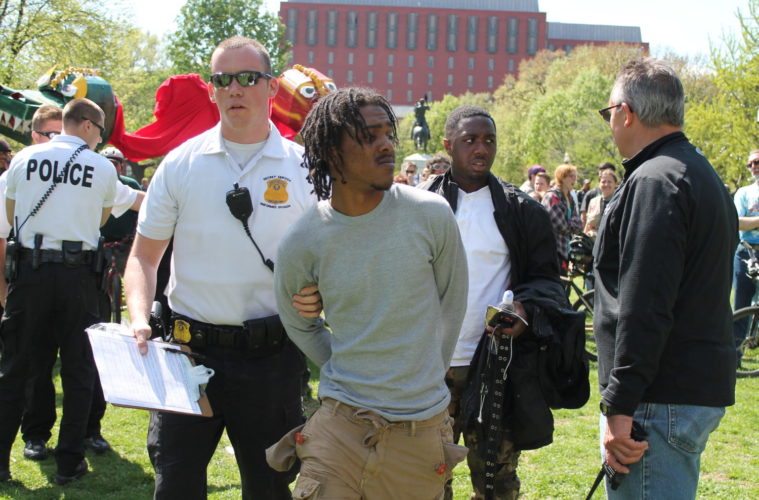While discriminatory enforcement of cannabis laws continues in communities of color despite legalization, a new report from the American Civil Liberties Union shows Los Angeles and much of California leading the pack when it comes to breaking the trend nationally.
Predominantly black neighborhoods have long been the most devastated by pot laws and the wider war on drugs. Echoing this, the new report, titled A Tale of Two Countries: Racially Targeted Arrests in the Era of Marijuana Reform, is actually an update to 2013’s The War on Marijuana in Black and White. The original report has been regularly cited in the years since by virtually everyone involved in the social justice aspects of pot reform.
The fresh data shows 6.1 million marijuana-related arrests from 2010-2018. These arrests accounted for a total of 43 percent of all drug arrests in the U.S. The ACLU noted that in 2018, six years removed from the first states legalizing marijuana, there were more arrests for pot offenders than all violent offenders combined. There were also 100,000 more pot arrests in 2018 than in 2015.
The ACLU found that in every state and 96 percent of the counties they reviewed, “Black people were much more likely to be arrested than white people for marijuana possession. Overall, these disparities have not improved.” The numbers show black Americans are 3.64 times more likely to be arrested for marijuana possession than a white person despite similar use rates in both communities. Even worse, in 10 states members of Black communities are five times more likely to end up in handcuffs over cannabis.
“Many state and local governments across the country continue to aggressively enforce marijuana laws, disproportionately targeting Black communities,” said Ezekiel Edwards, director of the Criminal Law Reform Project at the ACLU and one of the primary authors of the report. “Criminalizing people who use marijuana needlessly entangles hundreds of thousands of people in the criminal legal system every year at a tremendous individual and societal cost. As a matter of racial justice and sound public health policy, every state in the country must legalize marijuana with racial equity at the foundation of such reform.”
Montana proved to have the most brutal, racial profiling with African Americans 9.6 times more likely to get arrested for pot. Colorado was at the bottom of the list. Despite being at the bottom of the list, communities of color in Colorado were still 1.5 times as likely to be arrested for pot.
The Local Data
The ACLU made an interactive graphic where you can dive inside the numbers state by state and county by county. On the California page you’ll see that statewide, African Americans are 1.8 times more likely to get arrested for pot. That puts us four spots from the bottom of the list. On another positive note, L.A. County is actually beating that statewide number. Locally, the black population is 1.5 times more likely to be arrested for pot.
But the same could not be north and south of the city in Ventura and Orange counties. Both counties saw averages that were double the state average when it came to discrimination in pot arrests. But the highest rates in the state were in Siskiyou County where Blacks are eight times more likely to face arrest.
The nation’s oldest marijuana reform group discussed some of the positive takeaways in the report and the more unfortunate aspects.
“While we are pleased to see the overall number of possession arrests dramatically decline in legal states, the persistent racial disparity among those who are arrested for violating marijuana laws speaks to a larger underlying problem with the way in which law enforcement often interacts with citizens, particularly communities of color,” said NORML’s political director Justin Strekal.
Strekal went on to remind that legalizing marijuana isn’t a one-stop fix to dealing with racism in America, but this new ACLU report shows it’s certainly part of the conversation.
“The legalization of marijuana is not a panacea to solve the structural problems of systemic racism that persist in America,” Strekal said, “Nevertheless, legalizing and regulating cannabis reduces the total volume of marijuana arrests as well as one of the primary reasons for police interactions with the public — interactions that have been historically abused by police against people of color.”
Social Equity Funding
Here in L.A., the Social Equity Program is meant to write some of the wrongs of the past. Through the hiccups of the licensing process, there is still plenty of work to be done. But on Tuesday it was announced the Governor’s Office of Business and Economic Development had awarded the L.A. Department of Cannabis Regulation $6,042,014.23 in grant funding from the California Cannabis Equity Grant Program for Local Jurisdictions to get that work done. The money proves to be a big jump from the $1,834,156.38 the DCR received last year and hopefully should alleviate some local issues.
“These Cannabis Equity Grants reflect California’s desire to lead our legalization efforts with equity and inclusivity,” said Nicole Elliott, Governor Newsom’s Senior Advisor on Cannabis in a statement this week. “We applaud these jurisdictions for not only embracing the challenge of creating pathways to participate in a legitimate cannabis marketplace, but for doing so in a thoughtful way that seeks to uplift all communities. It is our hope that these efforts lead to the creation of a truly diverse industry and that these programs serve as a blueprint for others who share in our commitment to address systemic discrimination and create real prosperity for all.”
Advertising disclosure: We may receive compensation for some of the links in our stories. Thank you for supporting LA Weekly and our advertisers.

